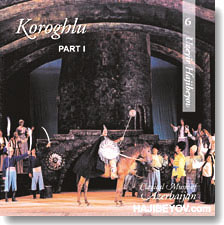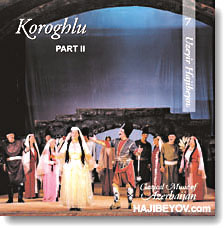|
| | | | | | | | Koroghlu (Son
of a Blind Man)
From Azerbaijan International (AI 9.3) Autumn 2001. By Betty Blair The crowning achievement of Uzeyir Hajibeyov's musical career was his opera "Koroghlu" (Son of a Blind Man). In 1938 it came under the limelight when it was featured at the "Decade of Azerbaijani Arts" in Moscow. Stalin was seated in the audience for that performance. Afterwards, he and some top Communist Party officials gathered around the musicians. One of them commended Hajibeyov by saying, "You ought to write a couple more operas like that." Suddenly Stalin's voice inserted an emphatic "No!" Hajibeyov was startled. Stalin's comment was particularly unsettling since the performance had been superb. There was a long pause. Nobody knew what to say. Those were perilous times (1937-1938), at the height of Stalin's Repression, when hundreds of thousands of Soviet citizens were being arrested, exiled and executed. What could Stalin mean? Then he broke his silence. "Don't write a couple more," he told the composer. "Write two couples!" "Koroghlu" is about an exuberant quest for freedom and independence. The storyline is based on a popular legend told by ashugs (wandering minstrels) as they meandered through local villages. It was about poor, abused villagers who rise up to defeat their unjust, oppressive khans and beys (landowners). This plot matched perfectly with the ideology that the Soviets were propagating. In hindsight, when one considers the havoc that the Soviet system wrecked on Hajibeyov's own personal life, it's hard to believe that it was really khans and landowners that he had in mind when his characters raged against injustice and exploitation. The composer's own personal world had been turned upside down when the Bolsheviks took power in Baku in 1920. Hajibeyov distanced himself from political affairs during the Soviet period, but prior to pursuing a career in music, he had been involved in journalism and written many articles attacking political injustices. He is said to have written under 64 different pseudonyms - first when criticizing the colonialist policy of the Czarist regime (up until 1918), and then later when attacking the Bolsheviks. Hajibeyov was a member of the leading political party of the time - the Musavat party - which succeeded in establishing the Democratic Republic of Azerbaijan (1918-1920). When the Soviets came to power, most of the Musavat government leaders and individuals closely associated with them were arrested or killed. Miraculously, Hajibeyov was spared. Nariman Narimanov and Mir Jafar Baghirov are often credited for Hajibeyov's survival, but even so, he lived under the constant threat of being discredited as an "Enemy of the Nation". One of the consequences of the Bolshevik attack [April 28, 1920] was that Hajibeyov's family structure, like thousands of others, was destroyed - forever. Uzeyir's younger brother Jeyhun (1891-1962) had been in Paris with the official delegation from the Azerbaijan Democratic Republic. When the Bolsheviks seized Baku, Jeyhun knew his life would be endangered if he returned to Baku. He opted to remain abroad. Sadly, that exile lasted 40 years, until the end of his life. He never saw his family again. Professionally, Hajibeyov suffered during those years as well. Before the Soviets took power, he had been amazingly prolific. Between 1908 and 1915, he had written six operas and three musical comedies. With the arrival of the Bolsheviks, however, Hajibeyov suddenly discovered that the works that had been applauded only a few years earlier were receiving scathing reviews and being labeled as "bourgeois" and "pre-revolutionary". Clearly Hajibeyov felt the sting of these reversals. For the next 15 years, his creative output lagged. Not until the early 1930s did he start producing major works again, but that long and difficult gestation period gave birth to his most magnificent and powerful work - "Koroghlu". Ironically, with the production of "Koroghlu", Hajibeyov came to be honored by the system that he loathed. He received the Soviet Union's most prestigious awards for composing this opera, including the Lenin Award (1938), the Stalin Award (1941) and "People's Artist of the USSR" (1941). Though one might be hard put to prove that the opera was, in fact, attacking the oppressive system of the Soviet Union, a careful study of the text suggests a broad interpretation of the concept of oppressor. Consider the speech of the evil khan: "Our country wouldn't exist without
tyranny. "If you want power, oppress the subjects The quest for freedom and independence is clearly the underlying theme when the chorus replies: "No matter how much service you render, But Koroghlu is resolute: It is the spirit of hope embodied in the words of Koroghlu's love, Nigar, that probably best epitomized the dreams of Hajibeyov and his contemporaries: "A day will come when vengeance For the masses, that day was a long time
in coming. But 50 years later, the entire Soviet political and
economic system was on the verge of collapse. |


